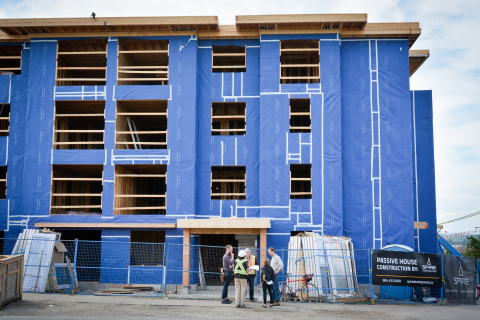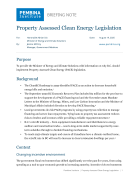B.C.’s forthcoming clean growth strategy represents a big opportunity for the province to demonstrate to the rest of Canada how policies to secure a clean and prosperous economy can be implemented successfully. Proposed actions in the government’s first three intentions papers on Clean, Efficient Buildings; Clean Transportation; and A Clean Growth Program for Industry offer early signs of what we might see in this fall’s strategy.
We are pleased these actions will be part of a wider clean growth strategy, which brings together the province’s climate plan, energy road map, and economic strategy. An integrated approach is key to accelerating the low-carbon energy transition, curbing climate-damaging carbon pollution, and securing a prosperous economy.
The task of reducing our carbon pollution must not be underestimated. Today, B.C.’s emissions stand at 62 megatonnes (Mt CO2e). B.C. has legislated targets to reduce our carbon pollution to 40 Mt by 2030 (a 40% reduction from 2007 levels), 27 Mt by 2040 (60% reduction), and 13 Mt by 2050 (80% reduction). Ten years ago, with the introduction of B.C.’s first Climate Action Plan, we saw emissions reductions between 2008 and 2011, and B.C. was seen as a climate champion. Since 2012, with many climate policies stalled or repealed, our emissions started to rise again. Now we must be ambitious to make up for lost time.
Heading in the right direction
While the proposed actions in the three intentions papers address only a portion of B.C.’s overall emissions sources, the direction of the papers gives us reason for optimism. Within these papers are some strong policies that, if adopted, will be amongst the boldest in Canada and North America. We look forward to announcements of further actions to address other emissions sources in the coming months, and expect them to contain a similar level of ambition.
When the clean growth strategy is released this fall, we will dig into the numbers to assess how its various pieces will contribute to emissions reductions in each sector and for B.C. overall. We also expect the energy planning process to determine how B.C.’s energy needs in a low-carbon economy will be met through efficiency, conservation, and clean electricity. Investments in training and innovation will be required to tap into the vast potential for jobs in a clean economy — for example, in the construction and upgrading of low-carbon buildings, the development of technology to help us use energy wisely, and the provision of low-carbon solutions to industry.
Ensuring transparency and accountability
The ability to monitor our progress and adjust our plans as needed over time are critical to ensuring successful implementation of the clean growth strategy. B.C. already has some key monitoring and reporting mechanisms in place or forthcoming, including 10-year emissions targets, a commitment to introduce sectoral targets, legislated requirements for bi-annual progress reports, and the Climate Solutions and Clean Growth Advisory Council.
We recommend the government build upon these tools with the following mechanisms:
- Carbon budgeting to forecast and allocate emissions to each sector (and B.C. as a whole)
- Independent monitoring and verification of progress towards achieving B.C.’s carbon budget
- Detailed, publicly released plans and annual reports on progress towards the budget
- Evaluation and adjustment of policies and projects based on their impact on the budget
Informing the process
In our submissions, we have provided our analysis and recommendations in response to the intentions papers for buildings, transportation, and industry. Some of the stronger policies outlined in these papers, if coupled with our recommendations for implementation, have the potential to make B.C. a climate leader again.
We encourage you to review the intentions papers and our submissions. We hope you will share your thoughts with government by the August 24 deadline for public input.
The Pembina Institute wishes to thank the Real Estate Foundation of B.C., Sitka Foundation, and North Growth Foundation for their generous support of our work.









